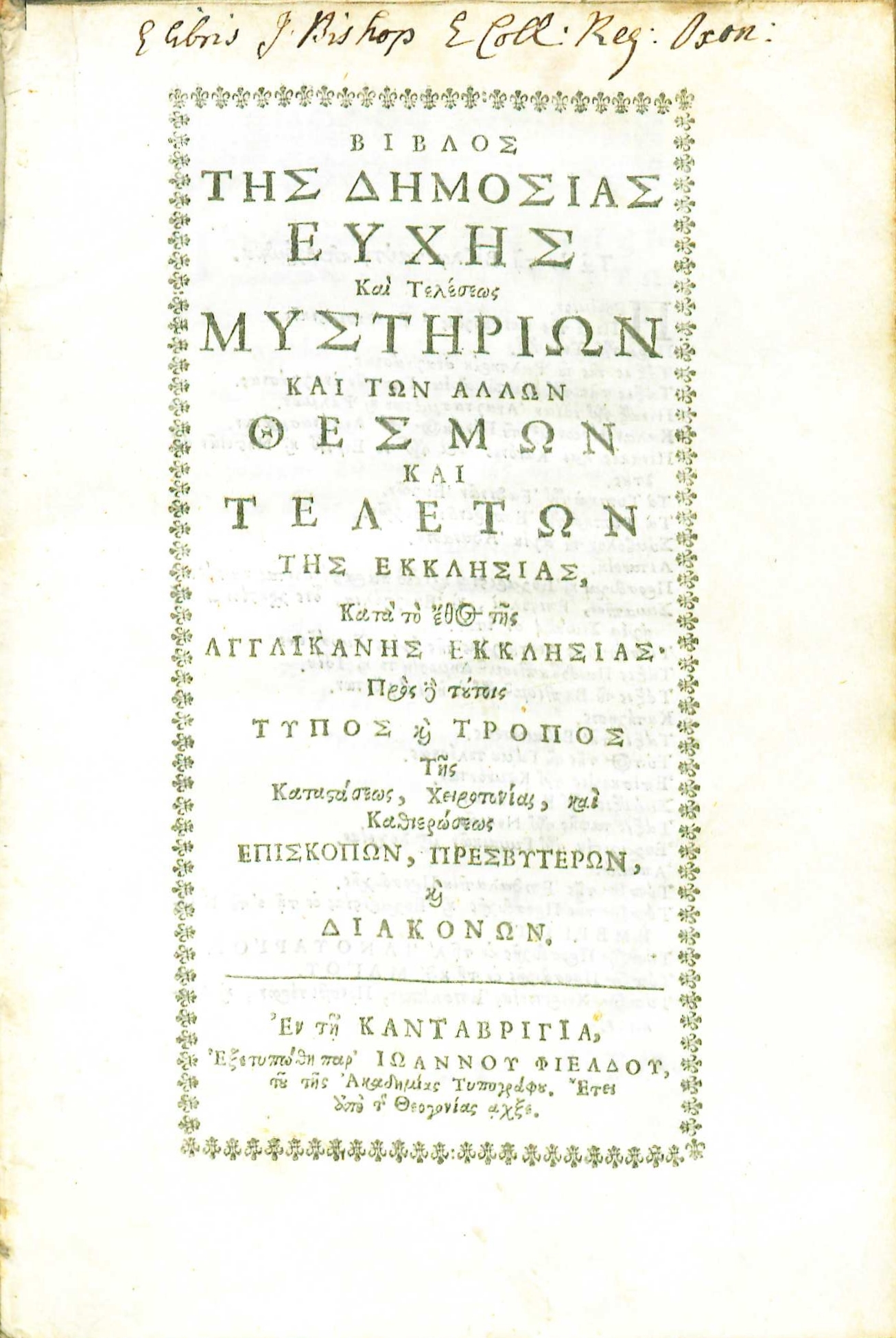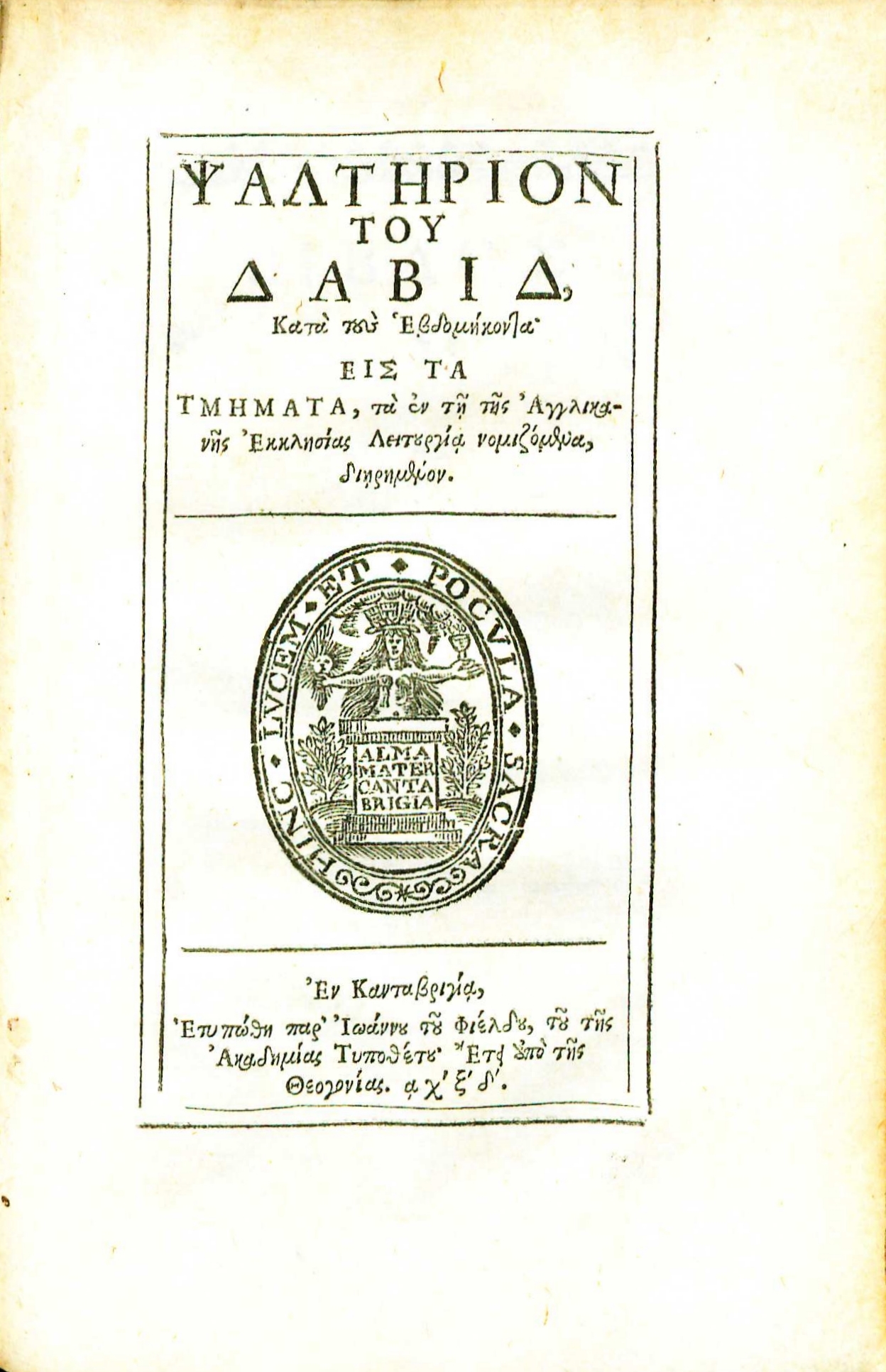Biblos tēs Dēmosias Euchēs: Kai Yeleseōs Mystēriōn kai tōn Allōn Thesmōn kai Teletōn tēs Ekklēsias
by The Church of England
| Book of Common Prayer (Greek) | |
|
Title page from Biblos tēs Dēmosias Euchēs, George Wythe Collection, Wolf Law Library, College of William & Mary. | |
| Author | Church of England |
| Translator | James Duport |
| Published | En tē Kantabrigia: Exetypōthē par' Iōannou Phieldou ... |
| Date | 1665 |
| Language | Greek |
| Pages | [36], 126, [2] |
| Desc. | 8vo (17 cm.) |
| Location | Shelf B-2 |
The Book of Common Prayer was altered significantly in 1552 to align it more definitively with Protestant traditions. Further revisions were made in 1559, 1604, and 1662.[5] Later proposals to alter it were unsuccessful, and the version used today is substantially similar to that of 1662.[6]
The influence of the Book of Common Prayer reaches beyond the Anglican Church; its prayers have been adapted by other Protestant denominations, and its marriage and burial rights are particularly well-known.[7] After the Bible, it is the second most frequently cited book in the Oxford Dictionary of Quotations.[8] Its influence on the English language is almost as great as that of the authorized King James version of the Bible and William Shakespeare’s works.[9]
In 1665, James Duport, Professor of Greek at the University of Cambridge, edited a verbatim Greek translation of the Book of Common Prayer intended primarily for use in colleges and universities.[10] Duport (1606-1679) was a tutor at Trinity College for over thirty years, and was known for taking on royalist students.[11] His other works included "A Homeric Paraphrase of the Book of Job," and Homeri Gnomologia, a collection of Homeric aphorisms annotated with quotations from the Bible and other texts.[12]
Evidence for Inclusion in Wythe's Library
George Wythe ordered "Common prayer in greek" from John Norton & Sons in a letter dated May 29, 1772. Records indicate the order was fulfilled.[13] All four of the Wythe Collection sources (Goodwin's pamphlet[14], Dean's Memo[15], Brown's Bibliography[16] and George Wythe's Library[17] on LibraryThing) refer to Wythe's letter. Neither Goodwin nor Dean identify a specific work or edition. Both Brown and LibraryThing include the 1665 edition of Biblos tēs Dēmosias Euchēs published in Cambridge based on the entry in Millicent Sowerby's catalog of Jefferson's library.[18]
Thomas Jefferson also listed "Liturgia Anglicana. Gr. 12mo." in his inventory of Wythe's Library. He inherited two copies from Wythe, giving one to his grandson Thomas Jefferson Randolph, and keeping one for himself. Either may be the copy of Biblos tēs Dēmosias Euchēs that Jefferson sold to the Library of Congress in 1815.[19] Unfortunately, Jefferson's copy no longer exists to verify the edition or Wythe's prior ownership. Nevertheless, the Wolf Law Library purchased a copy of the 1665 edition as listed by Brown and LibraryThing.
Description of the Wolf Law Library's copy
Bound in contemporaneous full brown polished levant with gilt double ruled frame and tooled corners. Four raised bands and gilt tooling to spine and outer gilt dentelles. Includes the inscription "E libris J. Bishop E Coll: Reg: Oxon:" on the title page. Bound with: Psaltērion tou David. (En Kantabrigia: Etypothē par' Iōannou tou Fieldou, tou tēs Akadēmias typothetou, 1664).
Images of the library's copy of this book are available on Flickr. View the record for this book in William & Mary's online catalog.
See also
References
- ↑ Encyclopaedia Britannica Online, s.v. "Book of Common Prayer," accessed June 8, 2015.
- ↑ "The BCP Story," The Prayer Book Society, accessed June 8, 2015.
- ↑ Encyclopaedia Britannica Online, s.v. "Book of Common Prayer."
- ↑ "The BCP Story."
- ↑ Encyclopaedia Britannica Online, s.v. "Book of Common Prayer."
- ↑ Ibid.
- ↑ "The BCP Story."
- ↑ Ibid.
- ↑ Ibid.
- ↑ William Muss-Arnolt, "Chapter V: Latin and Greek Translations, II," in The Book of Common Prayer Among the Nations of the World (London: Society for Promoting Christian Knowledge, 1913).
- ↑ Rosemary O'Day, "Duport, James (1606-1679)" in Oxford English Dictionary of National Biography, accessed June 8, 2015.
- ↑ Ibid.
- ↑ Frances Norton Mason, ed., John Norton & Sons, Merchants of London and Virginia: Being the Papers from their Counting House for the Years 1750 to 1795 (Richmond, Virginia: Dietz Press, 1937), 242-243. The letter is endorsed "Virga. 29 May 1772 / George Wythe / Recd. 21 September / Goods Entd. pa. 163/ Ans. the March 1773."
- ↑ Mary R. M. Goodwin, The George Wythe House: Its Furniture and Furnishings (Williamsburg, Virginia: Colonial Williamsburg Foundation Library, 1958), LI.
- ↑ Memorandum from Barbara C. Dean, Colonial Williamsburg Found., to Mrs. Stiverson, Colonial Williamsburg Found. (June 16, 1975), 7 (on file at Wolf Law Library, College of William & Mary).
- ↑ Bennie Brown, "The Library of George Wythe of Williamsburg and Richmond," (unpublished manuscript, May, 2012, rev. May, 2014) Microsoft Word file. Earlier edition available at: https://digitalarchive.wm.edu/handle/10288/13433.
- ↑ LibraryThing, s.v. "Member: George Wythe," accessed on August 11, 2015.
- ↑ E. Millicent Sowerby, Catalogue of the Library of Thomas Jefferson (Washington, D.C.: The Library of Congress, 1952-1959), 2:113 [no.1508]. This edition may have been the only Greek version of the Book of Common Prayer available during Wythe's lifetime.
- ↑ E. Millicent Sowerby, Catalogue of the Library of Thomas Jefferson, (Washington, D.C.: The Library of Congress, 1952-1959), 2:113 [no.1508].

